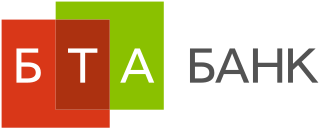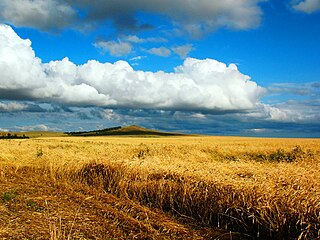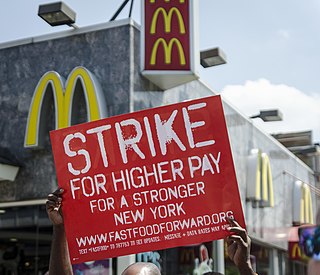A minimum wage is the lowest remuneration that employers can legally pay their employees—the price floor below which employees may not sell their labor. Most countries had introduced minimum wage legislation by the end of the 20th century. Because minimum wages increase the cost of labor, companies often try to avoid minimum wage laws by using gig workers, by moving labor to locations with lower or nonexistent minimum wages, or by automating job functions. Minimum wage policies can vary significantly between countries or even within a country, with different regions, sectors, or age groups having their own minimum wage rates. These variations are often influenced by factors such as the cost of living, regional economic conditions, and industry-specific factors.

The tenge is the currency of Kazakhstan. It is divided into 100 tiyn.

BTA Bank is a Kazakhstan bank with headquarters in Almaty. As of 2013 it was the third largest lender by assets. In 2009, BTA Bank was subject of one of the world's biggest financial frauds totaling US$5 billion.
Rudny a city on the Tobol River in Kostanay Region of Kazakhstan. It appeared in 1957 in connection with the development of iron ore deposits, the construction Sokolovsko-Sarbai mining, and processing enterprise. Population: 109,659 ;109,515.

Ahmedjan Smagululy Essimov is a Kazakh politician who's served as the chairman of Samruk-Kazyna from 2017 to 2021. Prior to that, he was the director of Expo 2017 from 2015 to 2017, akim of Almaty from 2008 to 2015, Minister of Agriculture from 2006 to 2008 and 2001 to 2004, Deputy Prime Minister of Kazakhstan from 2002 to 2006 and 1994 to 1996, First Deputy Prime Minister of Kazakhstan from 1996 to 1998, Acting Head of the Presidential Administration of Kazakhstan and State Secretary of Kazakhstan in 1996.

Agriculture in Kazakhstan remains a small scale sector of Kazakhstan's economy. Agriculture's contribution to the GDP is under 10% - it was recorded as 6.7%, and as occupying only 20% of labor. At the same time, more than 70% of its land is occupied in crops and animal husbandry. Compared to North America, a relatively small percentage of land is used for crops, with the percentage being higher in the north of the country. 70% of the agricultural land is permanent pastureland.
Minimum wage law is the body of law which prohibits employers from hiring employees or workers for less than a given hourly, daily or monthly minimum wage. More than 90% of all countries have some kind of minimum wage legislation.
The Kazakhstan Stock Exchange is a stock exchange located in Almaty, Kazakhstan. The exchange was founded in 1993.

In the United States, the minimum wage is set by U.S. labor law and a range of state and local laws. The first federal minimum wage was instituted in the National Industrial Recovery Act of 1933, signed into law by President Franklin D. Roosevelt, but later found to be unconstitutional. In 1938, the Fair Labor Standards Act established it at $0.25 an hour. Its purchasing power peaked in 1968, at $1.60. Since 2009, it has been $7.25 per hour.

The Minimum Wage OrdinanceCap. 608 is an ordinance enacted by the Legislative Council of Hong Kong to introduce a minimum wage in Hong Kong in July 2010. The executive branch proposed a minimum wage of HK$28 (~US$3.61) per hour in November 2010, which the Legislative Council voted to accept after much debate in January 2011. It came into effect on 1 May 2011. Prior to this, there had also been a fixed minimum wage for one specific class of workers, foreign domestic helpers, of HK$3,740/month. The Hong Kong statutory minimum wage for non-domestic workers is HK$37.5 (~US$4.83) per hour, effective 1 May 2019.
Bereke Bank (KASE:BERK) is a Kazakhstani commercial bank. The head office is in Almaty, Kazakhstan.

The Fight for $15 is an American political movement advocating for the minimum wage to be raised to USD$15 per hour. The federal minimum wage was last set at $7.25 per hour in 2009. The movement has involved strikes by child care, home healthcare, airport, gas station, convenience store, and fast food workers for increased wages and the right to form a labor union. The "Fight for $15" movement started in 2012, in response to workers' inability to cover their costs on such a low salary, as well as the stressful work conditions of many of the service jobs which pay the minimum wage.
The minimum wage in Taiwan is the lowest hourly or monthly remuneration that employers may legally pay to workers in Taiwan. It is also known as the basic wage. Taiwan's basic wage system is discussed in the third quarter of every year by the Basic Wage Committees and announced and implemented by the Executive Yuan after its approval. The current net minimum wage in Taiwan is NT$25,250 per month and NT$168 (US$6.07/€5.35) per hour, as of 1 January 2022.

Legislative elections were held in Kazakhstan on 20 March 2016. The date was set by president Nursultan Nazarbayev on 20 January 2016, when he dissolved the Mazhilis after it had requested dissolution on 13 January, with the reason cited being the economic crisis caused by low oil prices. Normally, the term of the Mazhilis would have expired in fall of 2016.







